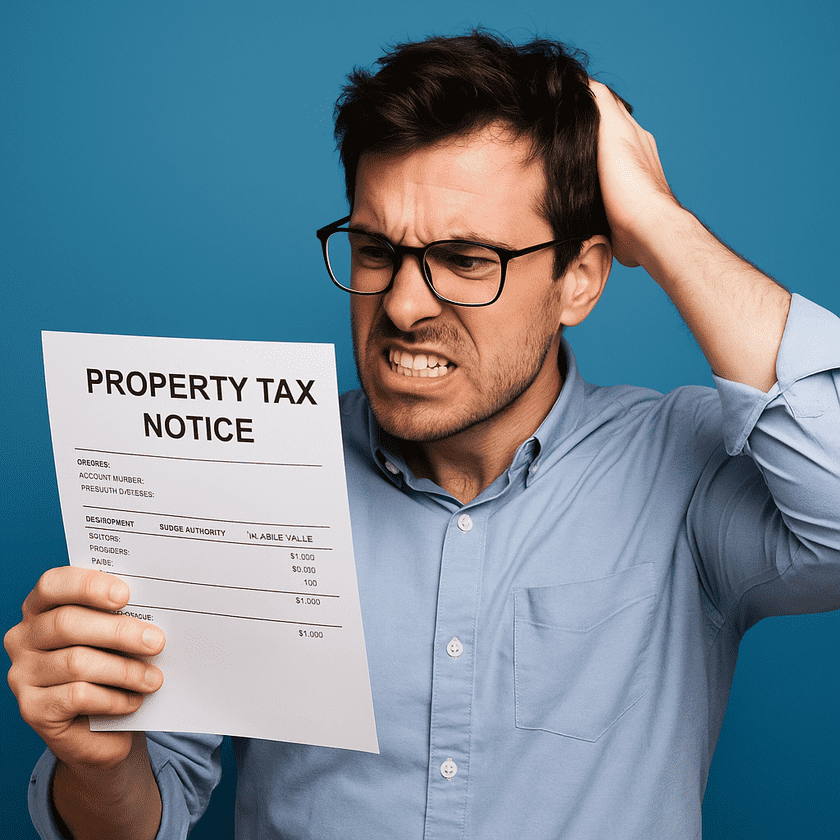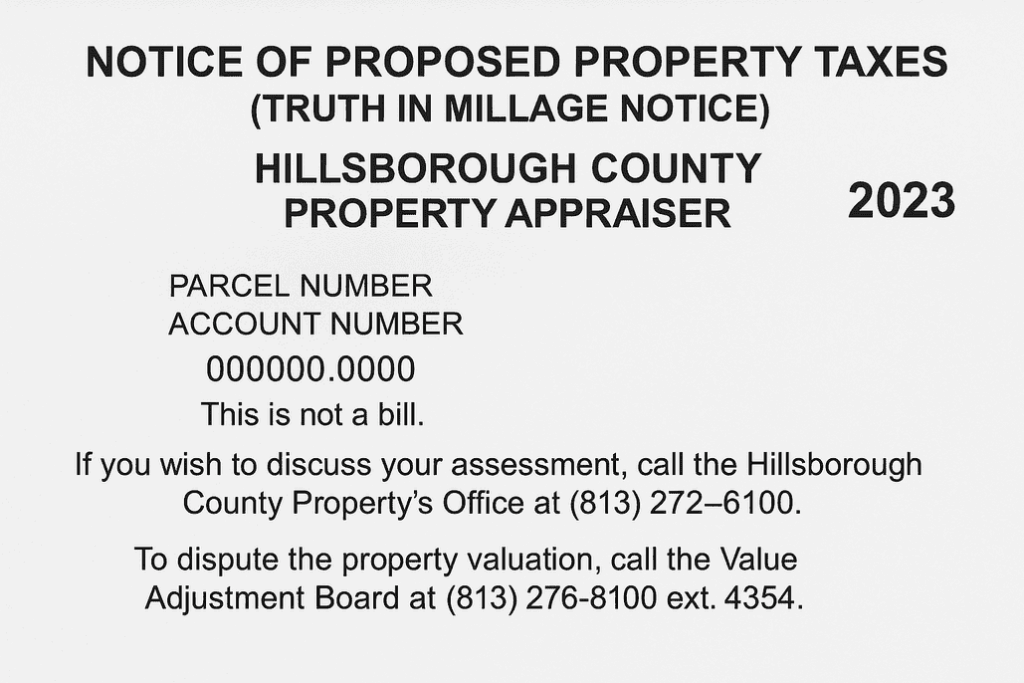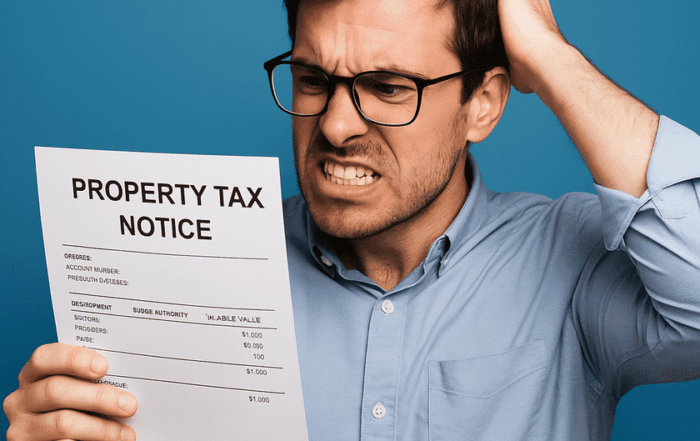
Your Property Taxes Are Too High—Let’s Fix That (Florida Investor Edition)
So, you bought a property in Florida—maybe your first one, maybe your tenth. You’ve been checking your numbers, watching the market, and now the tax bill shows up… and boom—it’s higher than you expected. Your property’s value didn’t go up that much, so why are your taxes acting like you just bought beachfront in Miami?
Well, let me let you in on a little secret most investors ignore: You can fight that tax bill. And in some cases? You can win. I helped my buddy David knock his down by 30% in the heart of Soho, Tampa. That’s real money saved—no fancy lawyers, no drama, just a bit of hustle.
Here’s how it works, how to do it, and why every smart investor should at least try it.
Welcome to Florida: Where the Taxman Assumes the Best
Let’s get something straight. Florida counties don’t really care what you paid for your house last year or what kind of shape it’s in. They have their own way of assigning value—and when prices are hot, those valuations can get a little… ambitious.
But here’s the thing most people miss: Florida law gives you a way to challenge the county’s assessment. Every year. Right there on your bill, usually at the bottom, there’s a deadline and instructions for how to file a petition to dispute it.
Most people throw the bill in a drawer or hit autopay. But not us. Not investors. We’re in this game to make money—and every dollar matters.
David’s Story: The 30% Tax Cut That Took 30 Minutes
Let’s talk about David real quick. First-year investor. Bought a small rental property in Soho, one of the coolest neighborhoods in Tampa. Cute little bungalow that needed a lot of work. We negotiated a sweet price, got it closed, and started renovating.
Then his property tax bill showed up. The county said his place was worth $525,000. But he paid $400,000 just a few months earlier—and had proof it needed work.
He called me freaking out.
“Jorge, I think they messed up! This tax bill makes no sense!”
I told him, “Good. Let’s challenge it.”
We gathered a few photos showing the pre-reno condition, his closing HUD, and pulled three nearby comps that were in better shape but listed lower.
He filed the dispute. Cost him $15.
Two months later, boom—county agreed. New assessed value? $370,000.
Savings: Just over $2,000 for the year. That’s $166/month back in his pocket. That’s paint. That’s repairs. That’s leverage.
What Is a Property Tax Dispute Anyway?
In Florida, property taxes are based on the assessed value of your property, not necessarily what you paid or what Zillow says. The county property appraiser assigns that value every year.
But they don’t visit every property. They use formulas, trends, and data models—which can sometimes overestimate your value, especially if:
-
You bought recently for less than their number.
-
The home was distressed or needed major repairs.
-
Local comps are misleading.
-
You’re in a market correction and values are dipping.
When you challenge that number, you’re basically saying: “Hey, here’s why I think your math is off.”
The county then reviews your evidence and decides if they’ll change it.
When Should You Dispute?
You should consider disputing your property taxes in any of these situations:
-
Your purchase price was significantly lower than the assessed value.
-
You paid cash for a distressed property.
-
You bought from a motivated seller at a discount.
-
There was storm damage or ongoing repairs.
-
The market dipped slightly since last year.
-
Your property’s condition isn’t reflected in their estimate.
Florida counties base taxes on January 1st value. So if your house was a fixer-upper in January and the appraiser didn’t know that, you have a strong case.
The Process (Don’t Worry, It’s Easier Than You Think)
Step 1: Check Your Bill
Your TRIM notice (“Truth in Millage”) shows up around August. That’s the one that matters—it tells you what the county thinks your property is worth.
Look at the assessed value. If it feels high, that’s your red flag.
Step 2: Gather Your Evidence
Don’t get overwhelmed—this is where your investor brain kicks in. Gather:
-
Closing Statement (HUD or ALTA): Proof of what you paid.
-
Photos from time of purchase: Show rough condition, not HGTV glam.
-
Repair estimates or invoices: Even better if you haven’t started renovations yet.
-
Comparable Sales: Pull 3-5 comps from the same neighborhood, within 6 months, that sold for less or were in similar/better condition.
Pro tip: Don’t use Zillow for comps. Go to MLS data, or work with a licensed agent (or Graystone—we help all our clients with this).
Step 3: File the Petition
You can usually file online or by mail. Search “[Your County] Value Adjustment Board” or “VAB.”
Cost: $15–$25 depending on the county.
Deadline: It’s usually mid-September. Check your bill—don’t miss it.
Step 4: Wait for a Response
They’ll either:
-
Adjust your value (you win),
-
Ask for more info (you’re in the game),
-
Or schedule a hearing (still not bad—it’s virtual or informal in most counties).
What If You Lose?
Even if you lose, there’s no penalty. Your taxes won’t go up because you challenged. Worst-case scenario? They say no, and you pay what you would’ve paid anyway.
Best-case scenario? You save hundreds—sometimes thousands—per year.
It’s low risk, high reward.
The Mental Shift: Treat This Like ROI
Let’s say you save $1,200 a year by disputing one property. Do that on three houses, and that’s $3,600/year.
Multiply that by 10 years? That’s a used car, a down payment on another property, or repairs covered on your next flip.
You wouldn’t leave $3,600 sitting on the street. So don’t leave it on your tax bill.
Rookie Mistakes to Avoid
-
Waiting too long: That deadline is real. Miss it, and you’re out till next year.
-
Using bad comps: Stay local. Same zip, same style, same square footage.
-
Overdoing it: You’re not trying to say your home is worthless—just that it’s not worth what they think.
-
Not filing because it feels scary: The county actually expects a portion of people to challenge. It’s built into the system.
Extra Credit: Hire Help If You Want
If this still feels like too much, you can hire a property tax consultant. They usually charge a small percentage of what they save you—no savings, no fee.
But honestly? If you’ve ever negotiated a contractor bid, called a wholesaler, or dealt with a bank, this is easier.
Why This Matters More in 2025
Right now, in 2025, we’re in a weird market.
-
Prices have stabilized or dipped slightly in some areas.
-
Insurance premiums are up.
-
Rent growth is slowing.
-
Everyone’s watching expenses like a hawk.
This is the year to get lean. The year to stop giving the county free money because they used outdated comps from 2022 when everything was on fire.
My Advice to New Investors in Florida
If you’re in your first year of ownership, you’ve probably already spent a ton on closing costs, insurance, rehab, and maybe your first tenant or two.
You need to protect every dollar of cash flow. That tax bill isn’t final—it’s an invitation. Flip it over, follow the steps, and give yourself a chance to win.
Just like David did.
We didn’t use fancy lawyers. We didn’t threaten anyone. We just told the truth—with proof. And it worked.
Need Help?
If you’re a Graystone client, you already know—we’ve got your back on this. We’ll pull comps, help with the evidence, and even guide you through the filing process.
If you’re not a client yet but want help reviewing your assessment, reach out. The window to dispute closes fast, but it’s one of the easiest wins in the investor playbook.
And once you do it once, you’ll do it every year you need to. Because that’s what smart investors do.
Final Word
Every dollar counts. And sometimes, the easiest money is the money you don’t have to spend. Challenging your property taxes isn’t just smart—it’s part of playing the real estate game like a pro.
Keep it consistent, stay patient, stay true—if I did it, so can you. This is Jorge Vazquez, CEO of Graystone Investment Group and all our amazing companies, and Coach at Property Profit Academy. Thanks for tuning in—until the next article, take care and keep building!
If you’d like to connect directly with me, feel free to book a time here: https://graystoneig.com/ceo.
Pick your expert. Book your free 15-minute consult now. We are here to help!
Our Top Articles
Your Property Taxes Are Too High—Let’s Fix That (Florida Investor Edition)
Your Property Taxes Are Too High—Let’s Fix That (Florida Investor Edition) So, you bought a property in [...]
First Lien, Then Hustle: The Art of Adding a Second Mortgage
Today was one of those classic real estate days. I’m sitting there, finalizing a flip deal, and as I’m [...]
Tampa Rental Market 2025: What to Expect in Q3 and Q4
Let’s talk landlord to landlord. Between the 40+ properties I personally own and the nearly 300 I manage with [...]
Property Profit Academy:
✔ Learn to buy properties with little to no money down.
✔ Build a $10M portfolio step by step.
✔ Master strategies like BRRRR and house hacking.










